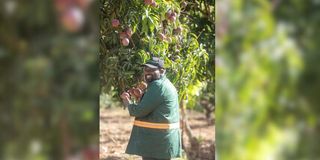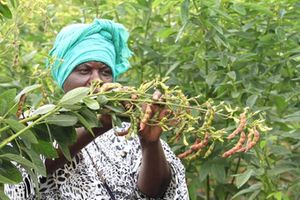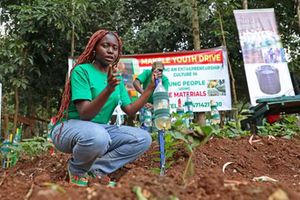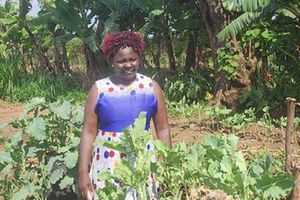
Goshen Farm Exporters CEO and founder Alex Muli in Makueni County on January 2025.
An agripreneur in Machakos is adding value to fruits and exporting the products despite climate challenges.
Alex Muli, the founder and CEO of Goshen Farm Exporters, says he is committed to transforming agriculture across Kenya.
Growing up in a fruit-farming region, Muli witnessed the market challenges his family endured. He established Goshen in 2010.
After completing his undergraduate studies and gaining experience as an apprentice at a fresh produce export firm, Muli saw a chance to improve livelihoods in his neighbourhood.
“Smallholders face many problems, including unfair pricing, limited market access and poor-post-harvest management. I wanted to address these through a sustainable approach,” he says.
“Exposure to global agribusiness also influenced the plan for starting a company that could have a lasting impact on the farming community.”
Muli noticed that smallholders produced high-quality fruits that could at times be rejected by the market.
Goshen came up with the “agricircular” programme, which transforms surplus fruits into snacks and converts waste to bio-fertiliser.
Even as he registered the business, focus was on exports and creating sustainable resilient markets for Kenyan produce.
Muli says the shift to dried fruit snacks was driven by rising airfreight costs and EU restrictions.
“We saw an opportunity to add value by making dry snacks, which have a long shelf-life. Transport costs are low and such products meet the growing demand for healthy, sustainable foods. This allowed us to stabilise prices and support our farmer network effectively,” he says.
With the challenge of climate change, Goshen encourages farmers to adopt water-retention polymer crystals and bio-fertiliser in an effort to enhance soil health.
Muli recently started a climate resilience programme aimed at planting 250,000 mango trees.
“Polymer crystals help the soil retain moisture even during dry periods. This simple innovation has resulted in more stable yields,” he says.
Goshen is a pioneer in commercial fruit dehydration in Kenya. However, securing skilled labour and appropriate kits presented a problem in the early stages.
“We invested heavily in training and imported special gadgets. Over time, our workers have developed the skills necessary to maintain and repair the equipment,” he says.
Goshen adds value to mango, pineapple, banana, coconut, papaya, plantains and other fruits.
Muli also processes dry chilli flakes and powder, along with new offerings like dried mango with chilli, mixed dried fruit and CocoMango.
To preserve freshness and quality, the products are packaged in airtight aluminium packs.
He says his products are competitively priced to appeal to premium and ordinary customers.
“We use a closed-loop system that reduces waste and optimises resource efficiency, from training farmers in agro-ecology to utilising renewable energy at the processor,” he says.
Goshen’s farmer programmes are designed to support women through tailored training, improved access to inputs and direct market linkages.
“As climate change affects yields, we provide farmers with key inputs instead of loans. Through a vetted check-off system, we supply fly traps, seedlings and biofertiliser,” he says.
To maximise farmer benefits, Goshen combines market contracts and input supplies with free training and technical support. The technical team conducts regular site visits, providing expert guidance on best practices at every stage of crop production.
Muli says while Goshen focuses on organic certification and helping farms comply with standards, it also promotes sustainable food systems through training and demonstrations. Goshen trained more than 1,000 farmers in these practices in 2024, he says.
“Our production minimises environmental impact through efficient resource use and recycling waste but we still face challenges like relying on air freight and plastic packaging to maintain product quality,” he explains.
The fruits taken to the factory are inspected, ripened and sorted. They are then washed, sliced and loaded into dehydrators for six to eight hours before being packed in bulk or individual pouches. Finished products are stored in coldrooms until distribution.
Certification has enabled the company to access premium markets locally and abroad while also building customer confidence.
Muli says Goshen is expanding its integrated agri-circular model and making use of advanced data analytics to improve farming.
“Our vision is to be Africa’s leading agri-circular food processor and exporter by 2035. We plan to achieve this through deepening commitment to agroecology, expanding our waste-to-value model and positioning ourselves in premium markets that value sustainable, minimally processed products,” he says.
Continuously innovating and investing in climate-smart agriculture, Goshen aims to create a replicable model for sustainable agribusiness in Africa.
Sustainable practices has contributed to the company’s efforts to meet industry standards and environment goals. Its focus on agroecology and organic certification complies with regulations on product safety and quality.
Muli says the role of agripreneurs is shifting towards sustainability, value-addition and technological integration.
“Technology will be essential in optimising farming, from precision agriculture to blockchain-based supply chains that ensure transparency. Entrepreneurs entering this space must focus on building impact-driven businesses that balance profits with social and environmental responsibility,” he says.









